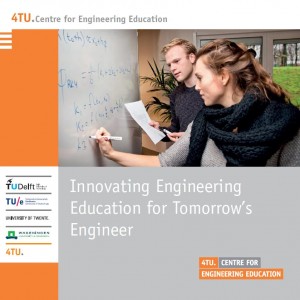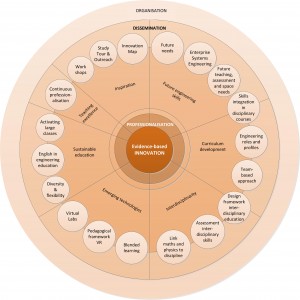June 18th 2020 was a date, engraved in my mind since more than half a year. It was supposed to be the day of my farewell party of TU Delft, and I had planned to use that party to launch my new book “Navigating the Landscape of Higher Engineering Education”. Corona decided differently. It postponed my farewell party, but did not stop me in completing and printing the book.
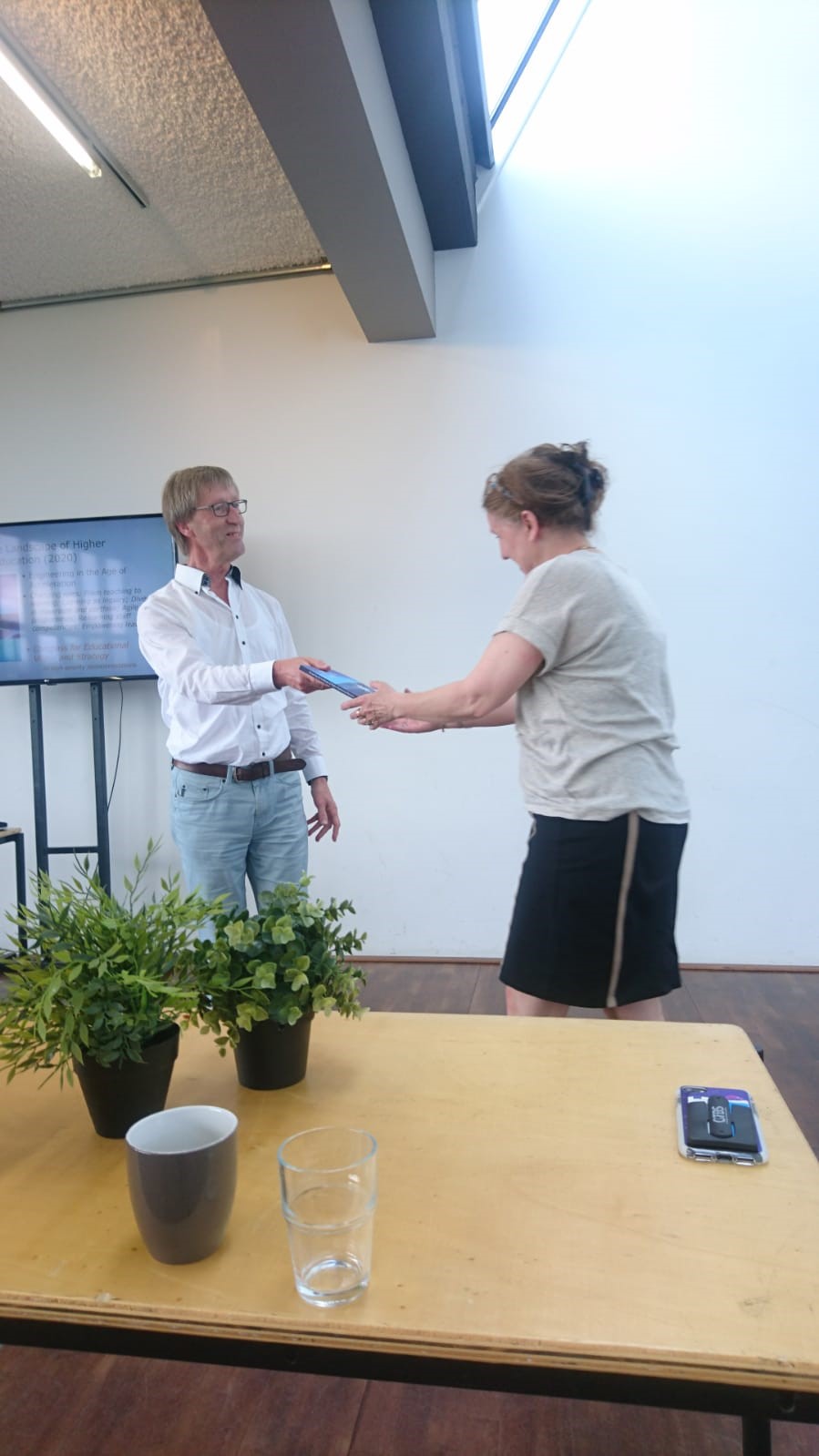
Hand-over of the first hardcopy to Renate Klaassen, my loyal ally in 4TU.Centre for Engineering Education (private photo)
When all of a sudden colleagues surprised me with an invitation for an intimate farewell party on behalf of the Delft section of 4TU.Centre for Engineering Education, without compromising the 1.5 m social distance, I decided to take this opportunity to release the book, on June 18th, and here it is.
Engineering Education in a Rapidly Changing World
In 2016 I had published my book “Engineering Education in a Rapidly Changing World”. It portrayed the VUCA (Volatile, Uncertain, Complex, Ambiguous) world, its impact on engineering education, and a personal vision on the changes that are needed for future-fit higher engineering education and an argumentation that each academic engineering programmes should be based upon three I-C-E cornerstones in order to be aligned with future demands and meet future expectations by society and the world of work: Innovation, Community and Employability.
About 1500 hardcopies and a multiple of that number of downloads found their way to programme coordinators, educational leaders, teaching staff, students all over the globe. The report stirred considerable debate across and beyond TU Delft and is being used by many universities worldwide, as an inspiration for educational leaders and teaching staff to rethink their courses and programmes. I had not expected the report would make me a thought leader in engineering education.
Widening gap
For me that book could not be the end, with the reaching of my legal retirement age in mind, and a head full of ideas and thoughts. My personal motivation to write a new book has therefore been to clear my head, and make my vision, experiences, thoughts and ideas available to others for use and inspiration.
As a Director of Education I have, more than my colleagues, felt responsible to be like an antenna, looking out for signals of change that might impact our educational programmes. In discussions with higher management, and in my day to day advisory work in and outside of university, I have noticed a scary widening gap between the visionaries and thought leaders on the one side, and the majority of academic staff including higher management on the other side. There is so much skepticism to upgrade programmes that have survived unaltered for decades. There is so much complacency with the status quo.
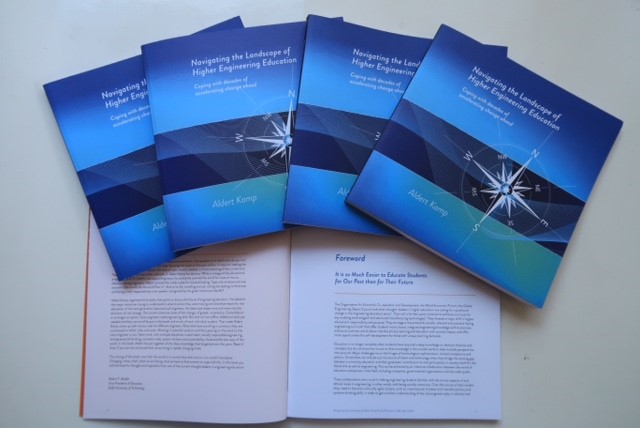
Release of Navigating the Landscape of Higher Engineering Education – Coping with decades of accelerating change ahead (private photo)
Navigating the landscape of higher engineering education
The new book aims to complement the vision in Engineering Education in a Rapidly Changing World with new insights and offers a forward-thinking perspective on higher engineering education. It discusses the greater responsibility students have for their own education and learning process, the importance of professional skills, and the integration of the digital transformation and responsible engineering in curricula. It looks at the essence of impactful education, the need to upskill staff, and the impact of the vastly altered population of learners, mainly Generation-Z students.
Bridging a gap
To bridge the gap between me as a thought leader and the academic teaching staff on the shop floor, I have made descriptions of frameworks, concrete examples and guiding principles for relevant subjects, such as the changing roles and skill sets in the engineering profession, the shift in focus from teaching to learning, learning as inquiry, diversity in the classroom, diversity in the educational portfolio, the learning, unlearning and relearning of staff competencies, the strengthening of university-industry collaboration, and about empowering leadership.
It discusses the greater responsibility students get for their own education and learning process, the need to integrate the digital transformation and responsible engineering in curricula. It looks at the essence of impactful education, the key aspects of challenge-based education and agile programmes, and the impact of the vastly altered population of learners, mainly Generation-Z students. Last but not least, for those who are really interested in long-term thinking with no box, the chapter about reframing engineering education will be of special interest.
A compass and 24 recommendations
I have written the concluding chapter as a compass for educational leaders. It has four compass points: Skillsets and mindsets for 21st century engineers; Pedagogical and technological innovations in education; Continuous/life time education: continuous upskilling and relearning; and Educational strategy and leadership. In these compass points I give 24 recommendations for the development of educational vision and strategy and their implementation in organisations and curricula.
Enjoy reading
The preface by Robert F. Mudde, Vice President of Education at TU Delft reads “The timing of the book, now that the world is in turmoil due to corona virus couldn’t be better. Changing times, that’s what we are facing. And we have to find answers to cope with this. In this book you will find food for thought and inspiration from one of the current thought leaders in engineering education.”
The book is available free of charge. Please find its link, and links to other documents and presentations about future engineering education that may be of interest, at my private website.
PLEASE NOTE:
Due to my retirement I will stop writing blogs on the 4TU.CEE and TU Delft weblog page.
If you don’t want to miss any updates about my work on future-fit engineering education, please subscribe to my blog at the website of my private business Aldert Kamp Advies.


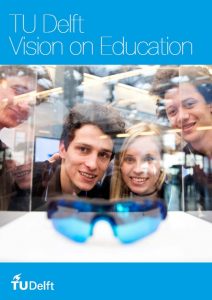
 TU Delft faces interesting challenges to remain an active and engaged change-maker in the landscape of 21st century higher engineering education. The university has always strongly focused on equipping students with deep discipline-based knowledge and left the development of the durable and wider professional skills to the early years of the professional career. And that won’t change. But future engineer business increasingly needs talents that combine deep disciplinary expertise with social, political, and economic capabilities, who are able to connect the dots, think holistically, and are culturally agile.
TU Delft faces interesting challenges to remain an active and engaged change-maker in the landscape of 21st century higher engineering education. The university has always strongly focused on equipping students with deep discipline-based knowledge and left the development of the durable and wider professional skills to the early years of the professional career. And that won’t change. But future engineer business increasingly needs talents that combine deep disciplinary expertise with social, political, and economic capabilities, who are able to connect the dots, think holistically, and are culturally agile.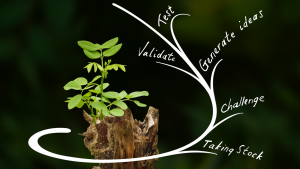
 In the course they will:
In the course they will:
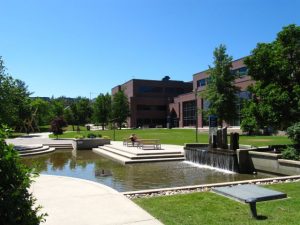
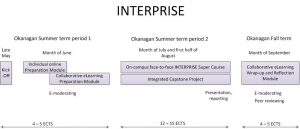
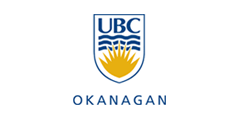
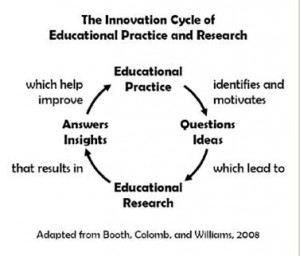 Innovating curricula is about designing effective learning and teaching environments in continual cycles of educational practice and research. That’s what I have always learned in theory. But I have been curious why the professors and lecturers take very different approaches when they do research in their field of engineering or in their education. The structured
Innovating curricula is about designing effective learning and teaching environments in continual cycles of educational practice and research. That’s what I have always learned in theory. But I have been curious why the professors and lecturers take very different approaches when they do research in their field of engineering or in their education. The structured 